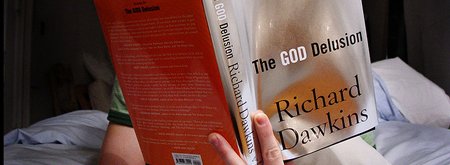The Dawkins Letters
The Dawkins Letters are a response to Richard Dawkins' book The God Delusion. The author, David Robertson, wrote a series of letters to Professor Dawkins, which were published on Dawkins' website. These letters have now been published in a slightly revised form in The Dawkins Letters.
10 November 2006
Dear Dr Dawkins,
Forgive me for writing you but I am really frustrated. You see, I read your book, The God Delusion (great title but of course it does just open itself to the rejoinder in the title above – which I am sure many others will pick up on). There was so much in it that I could identify with and yet so much that was to my mind just simply wrong. I would love to discuss it with you, or with those who are your disciples, but I’m afraid that I am not an Oxford Don, I don’t have access to the media you do, and I am not part of the Establishment. Therefore it is very difficult to dialogue about these things. And of course you have stated that you do not discuss with ‘fundamentalists’ or those who would be stupid enough to disagree with you. Apparently you want ‘intelligent’ conversation and anyone who believes in revelation or supernaturalism is de facto non intelligent, therefore not worth discussing with. Given that the subject you are so vehement about is the whole question of supernaturalism and whether there is a God or not, do you not think it is kind of loading the dice to only discuss with those who already share your presuppositions?
Anyway although I do not expect you to read this, I am writing it for my own benefit and for the sake of those who having read your book, perhaps share the same frustrations, or maybe have even been influenced or feel threatened by it. Of course I realise that most people who buy your book will already be converts – they already share your faith and will be looking for reassurance or confirmation. Although your book is an evangelistic work, written with the specific intention of converting religious readers to atheists by the time they reach the end, you know as well as I do that the vast majority of people who read it will already be convinced. You are preaching to the choir. This is rather obvious even from the people who write the blurb on the jacket cover, admittedly not normally unbiased objective judges. Stephen Pinker, Brian Eno, Derren Brown and Philip Pullman all wax lyrical about your book – but then they would wouldn’t they? Each of them being convinced atheists already and fairly desperate to have their particular belief system endorsed. Pullman wants your anti-faith book to be put into every faith school (nothing like wanting to indoctrinate children is there?). Eno says it is ‘a book for the new millennium, one in which we may be released from lives dominated by the supernatural’. Heady stuff. But best of all is Derren Brown who affirms The God Delusion as his ‘favourite book of all time’. It is ‘a heroic and life-changing work’. He wants those who are ‘secure and intelligent enough to see the value of questioning their beliefs [to] be big enough and strong enough to read this book’.
Well, I have read it. I did expect to be challenged. But actually I was very disappointed. Of course it was well written, very entertaining and passionate. But at an intellectual and logical level it really misses the mark. I’m sorry but I honestly think I could have made a better case for atheism. Most of the arguments are of sixth form school boy variety. And this from the ‘one of the worlds’ top three intellectuals’ (as the book jacket so helpfully reminds us). Is this really the best that atheism has to offer? (Memo to self - why did I once feel so challenged by atheism?). What is disturbing about this is that your fundamentalist atheism will actually be taken seriously by some and will be used to reinforce their already prejudiced anti-religion and anti-Christian stance. Your ‘arguments’ will be repeated ad nauseam in newspaper letters columns, opinion pages, pubs and dinner tables throughout the land. You will forgive me saying this but it seems remarkably similar to the kind of thing that ‘intellectuals’ were putting out in 1930s Germany about the Jews and Judaism. Just as the Jews were responsible for all the ills in Weimar Germany, so according to your book religious people are responsible for the majority of ills in today’s society. Along with John Lennon you want us to ‘imagine’ a world with no religion. A world which you claim would have no suicide bombers (I assume it slipped your mind that the majority of suicide attacks have been by the secular Sri Lankan Tamil Tigers?), no crusades, no 9/11, no Israeli/Palestinian wars, etc. By the way John Lennon was one of my heroes and I loved Imagine. Then I grew up and realised that it took a great deal of imagination to take seriously a song which spoke of imagining a world ‘with no possessions too’ written by a man who lived in a mansion and had an abundance of possessions, whilst there were millions dying from lack of resources. It seems to me that your vision/imagination is almost as unrealistic as Lennon’s. You want us to imagine that there is no God. And then you do not really address the consequences of such a belief. Of course you have some awareness of what these are. That’s why you tell us that although when it comes to biology you are a strict Darwinianist, when it comes to politics, society etc. you cannot go that route. Social Darwinianism would bring Hell on earth. I agree with your conclusions – I just find it difficult to follow the logic.
Over the next few weeks I want to write a letter in response to each of your chapters. As you correctly point out, each of them deals with issues that are fundamental to our existence, meaning and well being as humans. But let me finish off this introductory letter by looking at a couple of other things you state in your own introduction.
You state that your book is for those who have been brought up in a particular religious faith and now either no longer believe it, or are unhappy in it and want out. You want to raise the consciousness of such people to the extent that they can realise that they can get out. Do you really think that people are that stupid? Do most people not already know that is perfectly possible to leave a religion and not suffer any significant social consequences – at least in non-Islamic countries? I was brought up in a religious home and knew from a very young age that not only was it possible to leave, but that for many people it would be considered normal. Indeed none of my four siblings currently attend Church. In Evangelical Christian terms they would be considered ‘backslidden’. But perhaps you are right – maybe they have been raised to a higher consciousness? I fought my own battles so that I could be free to think for myself. But it was not just, nor even primarily, against the religious teachings of my parents or others (and I did fight against them), but also the patronising expectations of teachers, media and others who just assumed that the only reason anyone would be religious was because of parental influence, brainwashing and a weak mind. You know the real relief came when I realised I could be a Christian and think for myself and seek to make a difference in the world. And that I did not have to buy into the all the quirks and cultural things of religious groups, nor the fundamentalism of the secularists who just knew that they were right.
I cannot think of a single career option in Britain where being an atheist would place you at a disadvantage (unless you are thinking of becoming a bishop – although given the recent history of men like Holloway that does also appear to be a career option for atheists). However there are many people for whom admitting they are ‘religious’ is a severe block to their career and life. Those who seek to be Christian politicians, singers, businessmen, teachers and social workers often face significant prejudice and irrational fear. It is sometimes advantageous to deny one’s faith or even to leave it. Being a Christian is more often than not a stumbling block to one’s chosen career path, rather than the other way around.
Of course there are those who belong to cults who exercise a form of mind control tantamount to brain washing but surely even you would not argue that every religious person is in that category – imprisoned in the snare of their own religion until the good knight, Sir Richard Dawkins, rides to their rescue and sets them free?! You seem to think that anyone who is religious is actually at a lower level of consciousness and needs to be set free by becoming an atheist. Of course you offer no empirical evidence for this. Like much of the book it is a presupposition (even a prejudice) which does not appear to be founded on anything other than you would like it to be so. Have you ever thought that there might be many others who are in the opposite position – brought up in an atheistic secular society and discovering that they can actually believe in God? Would you give them the freedom to do so? What would you do if your daughter turned out to be a Bible believing Christian? Would you disown her? Would you even allow her that choice? Or have you done your best to inoculate her against the virus of religion? I remember one young man, highly intelligent, who came to a Christianity Explored group. When he was asked his religious position he said ‘I’m an atheist, but I’m beginning to have my doubts’. I laughed. A backslidden atheist! I thought that was quite neat. Maybe there are a lot more of them than you think. You ought to be careful about the raising of consciousness – maybe people will become tired of your modernist certainties and instead find refuge in the clear fresh air of Jesus Christ!
I also smiled when I read your complaint that atheists were persecuted and misunderstood. Apparently you are the new ‘gays’ who need to ‘come out’. Forgive me for saying this but I had not noticed that atheists were particularly silent or poorly represented in British society (or even American). In Britain all our government institutions, media outlets and educational establishments are primarily secularist. The National Secular Society or the British Humanists get a far bigger exposure than the vast majority of Christian churches – despite the fact that most secular societies could fit their members into a phone box. Even when the Prime Minister is asked a relatively innocuous question about whether he prays, his media minder Mr Campbell felt compelled to point out ‘we don’t do God’. Atheism and secularism are without doubt the prevailing philosophies of those who consider themselves the elite.
You were given the immense privilege of having editorial control of your own TV series The Root of all Evil. Can you tell me when Channel 4 or even the BBC last gave an evangelical Christian the opportunity to produce a film demonstrating the evils of secularism? Do you not think that in an open and democratic society when you are allowed to make a ‘documentary’ attacking whole groups of people that they should at least be allowed some right of reply? Of course that is not going to happen – because as you well know, those who are primarily in charge of our media outlets are those who share many of your presuppositions and prefer to make programmes which present Christians as either weak ineffective Anglican vicars, or tub-thumping American Right Wing Evangelists who want to hang gays. Anything other than this simplistic view would be wrong. It is propaganda – not truth, not reason, not debate and most certainly not fair.
A few weeks ago it was reported that there was a meeting of BBC Executives where some had the gall to challenge the prevailing BBC philosophy. At that meeting it was admitted that the policy of the BBC was that secularism was the only philosophy to which others must eventually come. In other words other philosophies and belief systems can be tolerated but they must never be allowed any real say in the BBC. Some had the audaciousness to suggest that perhaps the BBC should recognise that secularism was a philosophy and not the philosophy. I hope that you will support such pluralistic open-mindedness.
But I suspect that you have written your book, not because atheists are a persecuted minority needing to come out of the closet, but rather because the atheist hegemony is now being challenged from all sides. In fact, having had a century of elitist domination and control many in the Western World are beginning to wake up to the fact that the secular emperor has no clothes. The 20th Century can truly be called the Failed Atheist Century. Can I recommend that you read an excellent book on this subject, written by one of your Oxford colleagues Niall Ferguson, The War of the World (History’s Age of Hatred)? He shares your evolutionary secularist presuppositions but his account of the 20th Century is a stunning indictment of the failure of secularism and ‘science’ to bring peace on earth.
Your book comes across as a desperate attempt to shore up secularism’s crumbling defences. To that extent it reminds me a lot of some of us in the Church, who faced with what seems to be overwhelming odds and staring defeat in the face, sometimes issue evangelistic tracts, articles and books which rather than really being aimed at the conversion of unbelievers are really designed to shore up the faith of the faithful. The God Delusion fits nicely into that category. I am sure you will delight your disciples, such as Philip Pullman, establishing what they already believe, but I very much doubt you will make any impact on others who are less fixed in their opinions and who really are seekers after truth. What I do appreciate about what you say is that, unlike the cowards and the lazy who want to deny its existence, you admit that there is such a thing as truth. You may laugh at the idea that the truth is ultimately found in Jesus Christ. However I remain an optimist. I believe not only in truth but also in the power of God and his Holy Spirit to bring enlightenment to even the darkest mind. So there is still hope for us both,
Yours etc
David Robertson
Go to Part 2
© 2007 David Robertson



